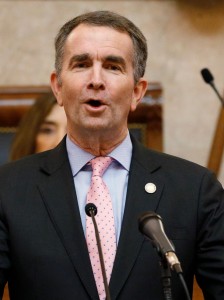From an Update by Ivy Main, Power for the People, VA, April 3, 2020
With Democrats in charge, Virginia passed a suite of bills that establish a sturdy framework for a transition to renewable energy in the electric sector.
At the center of this transformation are the Clean Economy Act, HB1526/SB851, and the Clean Energy and Community Flood Preparedness Act, HB981/SB1027. Other new laws direct further planning, make it easier for customers to install solar, improve the process for siting wind and solar farms, and expand financing options for energy efficiency and renewable energy.
Gov. Ralph Northam has now signed these bills. The legislation takes effect on July 1. One of the strongest arguments in support of our energy transition is that it will save money for consumers.
So what happens after July 1? How does this all work? Let’s look at the way these major pieces of legislation will change the energy landscape in Virginia.
Dominion’s plans for new gas plants come to a screeching halt
Before the 2020 legislative session, Dominion’s Integrated Resource Plan included plans for as many as 14 new gas combustion turbines to be built in pairs beginning in 2022. In December, the company announced plans to build four gas peaking units totaling nearly 1,000 MW, to come online in 2023 and 2024.
But that was then, and this is now. The Clean Economy Act prohibits the SCC from issuing a certificate of convenience and necessity for any carbon-emitting generating plant until at least January 1, 2022, when the secretaries of natural resources and commerce and trade submit a report to the General Assembly “on how to achieve 100 percent carbon-free electric energy generation by 2045 at least cost to ratepayers.”
Even with no further moratorium, Dominion will find it hard to sell the SCC on the need for new gas plants on top of all the renewable energy and energy storage mandated in the Clean Economy Act. Solar and battery storage together do the same job that a gas peaker would have done — but they are required, and the gas peaker is not. Meanwhile, the energy efficiency provisions of the act mean demand should start going down, not up.
Dominion has already signaled that it recognizes the days of new gas plants are largely over. On March 24, Dominion filed a request with the SCC to be excused from considering new fossil fuel and nuclear resources in its upcoming Integrated Resource Plan filing, arguing that “significant build-out of natural gas generation facilities is not currently viable” in light of the new legislation.
Fossil fuel and biomass plants start closing
By 2024, the Clean Economy Act requires the closure of all Dominion or APCo-owned oil-fueled generating plants in Virginia over 500 MW and all coal units other than Dominion’s Virginia City Hybrid plant in Wise County and the Clover Station that Dominion co-owns with Old Dominion Electric Cooperative.
This mandate is less draconian than it sounds; it forces the closure of just two coal units, both at Dominion’s Chesterfield plant. Other Dominion coal plants in Virginia have already been retired or switched to using gas or biomass, and one additional coal plant in West Virginia lies beyond the reach of the legislation. Oil-fired peaking units at Yorktown and Possum Point were already slated for retirement in 2021 and 2022. APCo owns no coal or biomass plants in Virginia.
Although the exceptions might appear to swallow the rule, the truth is that coal plants are too expensive to survive much longer anyway. One indication of this is a March 24 report Dominion filed with the SCC showing its fuel generation sources for 2019: coal has now fallen to below 8 percent of generation.
By 2028, Dominion’s biomass plants must shut down, another victory for consumers. All other carbon-emitting generating units in Virginia owned by Dominion and APCo must close by 2045, including the Virginia City plant and all the gas plants.
As of 2050, no carbon allowances can be awarded to any generating units that emit carbon dioxide, including those owned by the coops and merchant generators, with an exception for units under 25 MW as well as units bigger than 25 MW (if they are owned by politically well-connected multinational paper companies with highly-paid lobbyists).
MORE ON THESE UPDATES IN VIRGINIA FOR TOMORROW . . .
>>>>>>>>>>>>>>>>>>>>>>>>>>
See also: VIRGINIA becomes first state in the South to commit to carbon-free – The Washington Post, Gregory Schneider, April 13, 2020
RICHMOND — Over the weekend, Gov. Northam authorized the omnibus Virginia Clean Economy Act, which mandates that the state’s biggest utility, Dominion Energy, switch to renewable energy by 2045. Appalachian Power, which serves far southwest Virginia, must go carbon-free by 2050. Almost all the state’s coal plants will have to shut down by the end of 2024 under the new law. Virginia is the first state in the old Confederacy to embrace such clean-energy targets.

